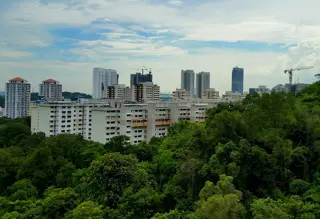Eco-Friendly Living on the Rise: Sustainable Housing Trends in Chennai 2025
 Chennai’s real estate scene in 2025 shows a clear move toward eco-conscious living, merging luxury with sustainability. As climate awareness and government rules get stricter, developers and buyers focus on green-certified homes, renewable energy, and water-saving tech. This trend isn’t just about cutting carbon footprints—it’s changing urban living and property values.
Chennai’s real estate scene in 2025 shows a clear move toward eco-conscious living, merging luxury with sustainability. As climate awareness and government rules get stricter, developers and buyers focus on green-certified homes, renewable energy, and water-saving tech. This trend isn’t just about cutting carbon footprints—it’s changing urban living and property values.
Main Drivers Behind the Demand for Sustainable Housing
Climate Adaptation and Savings Chennai’s coastal location makes it prone to rising sea levels and extreme weather. Eco-friendly homes with solar panels and better insulation lower long-term costs while providing resilience against climate threats.
Government and Institutional Standards Certifications like IGBC (Indian Green Building Council) meet strict sustainability benchmarks. These ratings attract premium buyers, showing energy efficiency and eco-friendly design.
Luxury and Tech Integration High-end developments now mix smart home features and IoT-enabled energy management with sustainable materials. For example, luxury gated communities use bamboo flooring, recycled steel, and low-VOC paints to appeal to wealthy, eco-conscious buyers.
Top Sustainable Features in Chennai’s Market
1. Green Building Certifications Builders are getting IGBC and Green Building certifications to prove their eco-friendly practices. These standards become selling points, ensuring properties meet strict criteria for water efficiency, waste reduction, and renewable energy.
2. Solar Power Integration Rooftop solar and net-zero energy homes are big trends. These systems not only cut electricity bills but also fit with Tamil Nadu’s renewable energy policies, offering extra incentives.
3. Rainwater Harvesting Systems Important in a water-scarce region, these systems are in both homes and businesses. They promote self-sufficiency and reduce reliance on city supplies, a key focus in Chennai’s suburbs.
4. Sustainable Material Innovation Recycled materials, low-maintenance paint, and natural insulation like coconut coir replace traditional options. These choices lower costs, reduce waste, and improve indoor air quality.
New Property Types and Locations
| Property Type | Key Characteristics | Popular Areas |
|---|---|---|
| Eco-Certified Apartments | IGBC-rated buildings, solar panels, centralized rainwater systems | Guduvanchery, Tambaram |
| Smart Homes | IoT-enabled energy management, biophilic design | Kelambakkam, Nungambakkam |
| Luxury Green Villas | Private solar farms, aerospace-standard insulation, natural cooling systems | Alwarpet, East Coast Road |
Future Outlook and Investor Opportunities
Sustainable housing demand will grow in Chennai’s suburbs due to affordability and bigger plots. Investors in premium areas focus on luxury gated communities with wellness amenities like yoga decks, hydro pools, and eco-features like geothermal cooling.
While regulatory compliance and higher upfront costs are challenges, Chennai’s support for green initiatives ensures long-term returns for eco-friendly projects. For buyers, the 2025 market offers a chance to invest in properties that blend environmental care with modern tech.